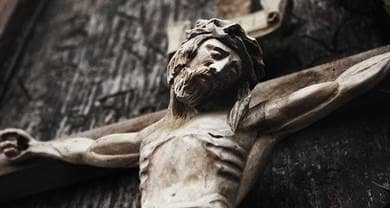- Trending:
- Pope Leo Xiv
- |
- Israel
- |
- Trump
- |
- Social Justice
- |
- Peace
- |
- Love

RELIGION LIBRARY
Roman Catholicism
Ultimate Reality and Divine Beings
Catholic belief in the ultimate source of reality is rooted in the first words of the Bible: "In the beginning, God created the heavens and the earth" (Genesis 1:1). These words open the Book of Genesis, which paints a portrait of God as the all-powerful, all-knowing creator of the cosmos and everything within it, including humanity. In this first serene overview of creation, readers are told of each element that "God saw that it was good." This serenity was soon disturbed as the first humans chose to follow their own desires rather than giving obedience to God, breaking the harmonious relationship between God and his human creation. This brokenness, which Christians since at least the 4th century call "the fall", allowed sin and death to enter the world.
Still, Catholics see this as a happy fall, a felix culpa (Latin for "happy fault") because it paved the way for something even greater than the initial harmony to take place: God incarnating as Jesus of Nazareth to redeem humans and repair the relationship broken by their sin. Catholics believe that the one God exists as three persons, the Trinity: God the Father; God the Son, who through his incarnation in Jesus acts as redeemer; and God the Holy Spirit, who dwells within the Church and within the heart of each believer. These are not three Gods, nor are they simply three aspects of one God; rather, they are expressions of the same unified whole. Christians through the centuries have suggested many analogies to try to express the nature of the Trinity, with one of the most popular being St. Augustine's description of the lover, the beloved, and the love that they share between them: humans may see three distinct elements, but they are elements of one loving relationship.
The doctrine of the Trinity is difficult both to express properly and to grasp fully, as even Augustine, one of the greatest intellects in Catholic history, knew. In one lovely apocryphal story, Augustine was walking on the beach trying to understand the mystery of the Trinity when he saw a child carrying buckets of sea water over to a hole in the sand. The child explained that he was trying to put all of the sea in the hole, and when Augustine remarked that this was impossible, the child looked at him and told him that it was just as impossible for humans to grasp the nature of the Trinity.
The God who is Father, Son, and Holy Spirit is the source and foundation of all that is, but Catholics also believe in the existence of lesser immortal beings known as angels (from Greek angelos, "messenger"). Angels are the servants and messengers of God, beings of pure spirit who possess free will and intellect. Catholics maintain that angels have often intervened in human history, sometimes without humans knowing of their presence because they have taken human form.
Angels also act as the soldiers of God. Before the foundations of the universe were laid, Catholics believe, an angel named Lucifer rebelled against God, seeking equality with God. This was the primal act of evil in the universe, and it split the heavenly hosts into those who maintained loyalty to God and those who chose to follow Lucifer. After this cosmic battle between the forces of good and the forces of evil, the angels who followed Lucifer were thrown with their master into the pit of hell. Lucifer was given dominion over hell, and with the sin of humanity he gained some dominion over humans as well. Lucifer, now often called the devil or Satan, acts as the Great Tempter enticing humans away from following God and doing what is good: they are themselves the continuing battlegrounds of the cosmic war, even though the ultimate victory of God is assured.
Many modern Catholics view stories such as the fall and the cosmic war as mythological, legends that explain the nature of reality rather than historically accurate records of divine activity. Catholics believe that the mystery of God cannot be fully contained within human understanding, and that stories such as these can best express truths that are ultimately beyond the ability of humans to grasp.
The Trinity and angels have existed since before the creation of the cosmos, but Catholics also venerate some human beings, especially the saints and Jesus' mother, Mary. A saint is one who is in communion with God, but Catholics usually think of the saints in a more particular way: as those humans who lived lives of such virtue and openness to God that they are assured of entering heaven at their deaths. From heaven, the saints are able to intercede with God-in effect, to pray for those who are still on earth-in a more direct way than humans can themselves.
Mary is sometimes referred to as the greatest of the saints, and for much of Catholic history she has been called upon to intercede with God. The relationship of Mary to the Trinity is unique: as the mother of Jesus, she participated in the incarnation of God in a way that no other human could. The Council of Ephesus in 431 declared her to be the theotokos, the God-bearer, although this term is not as important to Catholics as it is to Eastern Orthodox Christians. Catholics think of Mary as the Immaculate Conception, meaning that God prepared her for her role in the incarnation by allowing her to born without the original sin that plagues all other humans except her son. The Immaculate Conception and the bodily Assumption of Mary into heaven following her death are the only two Catholic doctrines that have ever been defined under the terms of papal infallibility.
Study Questions:
1. Why could original sin be seen as a necessary evil within the Catholic Church?
2. Describe the Catholic understanding of the Trinity.
3. How do Catholics understand angels? How do angels intervene in society?
4. How was Mary’s human nature different than the whole of humanity’s?










